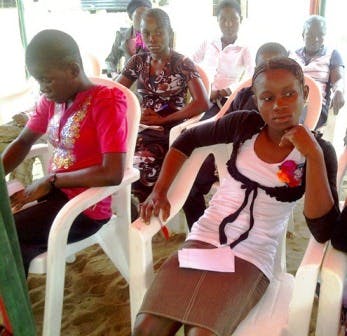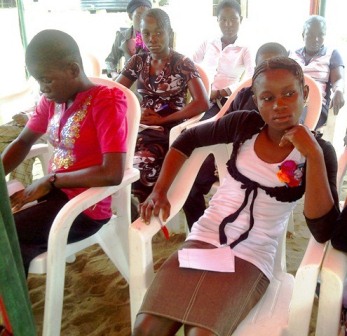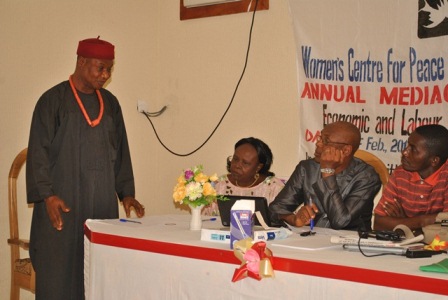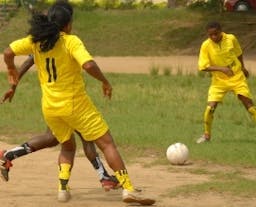September Discussion_Adolescent Girls in Domestic Work: Challenges for Change
Jan 21, 2015
First story



The plight of domestic workers in Africa gained more space in the limelight with the adoption of the ILO Domestic Workers Convention, with respect to safety, freedom from violence and human development. It is easy to overlook the place of adolescent domestic workers while looking at the labour rights of women in domestic work. In many countries and cultural societies, domestic work is not treated as work, yet that is a space occupied by many adolescent girls who are giving out all their youthful energy and years in tenuous labour that is grossly underpaid, under-valued and over-risky. For these reasons WOPED dedicated her Annual MediaCom Forum to Adolescent Girls in Domestic Labour, with the generous support of GFW/NIKE GGI. The MediaCom partners took a long hard look at the plight of adolescent domestic workers in the light of the ILO Domestic Workers Convention 2011 to see how well we are doing in responding to girls’ challenges in that field of work.
The scrutiny was not just to see how well Nigerian Government is doing but how well we, the members of Civil Society Organisations, including the Media, are doing to protect this particular group of vulnerable girls. The score card was very low. The truth is that sometimes CSOs, the Media and Community Councils including Youth Leaders and organized Labour Unions are busy looking at labour as a whole and neglect to scrutinize internal segments within the sector. At other times, we are busy examining Government initiatives or lack of them, and forget to turn the searchlight inwards often enough to see how we have not also done well in the little things we could do to ease adolescent girls’ predicament in the sub-sector, such as ‘blowing it on the roof top’, taking immediate action in our neighbourhoods and reporting events happening in households from broader national objectives and in a way that gives greater clarity and attention to the problems. For example, providing gender-specific data of exactly what happened, the significance of what happened, who and who are involved, their participation, the positions, problems and privileges of the participants in such incidents, the frequency and gravity of such happenings, and their implications for development goals at the larger level. These would be very helpful for laying down precedents to guide jurisprudence, advocacy and empowerment at different levels. Failing to do so has made it possible for society to treat issues of violence against adolescent domestic workers as one-off isolated cases that are non-issues because the required information to catalyze far-reaching decisions is rare, un-catalogued and often unsubstantiated. Therefore such matters continue to be consigned to the domestic domain as private matter and private problem of the individual involved. This was a great lesson for us at WOPED, and I wanted to share that.
At the media level, all the media editors and reporters that came acknowledged that internal politicking and gender-based power tussles and scuffles in media institutions create internal pressures that kill or diminish the coverage of good stories that could have been given deserving visibility in news reporting, like some cases of adolescent domestic workers. Again, it was agreed that commercial media are predisposed to ‘more important’ fast-selling political or social celebrity stories. They have little or no time and space for human rights and development issues except where that is backed by external funding interest. It was however highlighted that some media houses stand out as exceptions to the overall commercialization vogue.
The responsibilities and dangers that adolescent female domestic workers face are very sobering. They are exposed to great risk of incest, rape, murder, dehumanization, disfigurement, mental damage, social exclusion and loss of self-worth, and they are generally in more disadvantaged positions to negotiate. Access to education and health care are luxuries they cannot afford without the acquiescence and support of the employing family.
Despite the grim conditions in which the majority of them live and work, and the poor visibility and recognition they enjoy, it is an acknowledged fact that domestic workers, including adolescent female domestic workers, make enormous contributions to the socio-political economy of nations in ways too diverse and numerous to mention here in this brief entry. The ILO Convention is in place both in recognition of this fact and to order to propel change for improvement.
There is need to search for new ways for CSOs to make a difference. There is need to proceed more carefully to take incisive actions to protect the rights of adolescent girls to decent work, decent living, personal dignity, bodily integrity and social mobility.
To meet these needs, I would like to throw up a few questions that might help us reflect more deeply on workable solutions:
What exemplary empowerment and recovery programs are there to help female adolescent domestic workers in trouble? In what ways have those programs made a difference that can be replicated in other countries? Are there particular types of partnership needed for viable oversight functions in implementing the ILO Domestic Workers Convention for the greater good of girls at the national level?
How can we increase media responsibility to protect girls? How can we put adolescent girls’ news on the front pages and centerspreads despite commercialization?
These and many more questions will hopefully enable us deepen the conversation and find creative ways of helping adolescent girls in the domestic work industry; an industry which, despite its many challenges, is a field in which girls have made very useful contributions to society.
Thank you for giving me the opportunity to share these thoughts for further discussion.
Theresa U Michael




